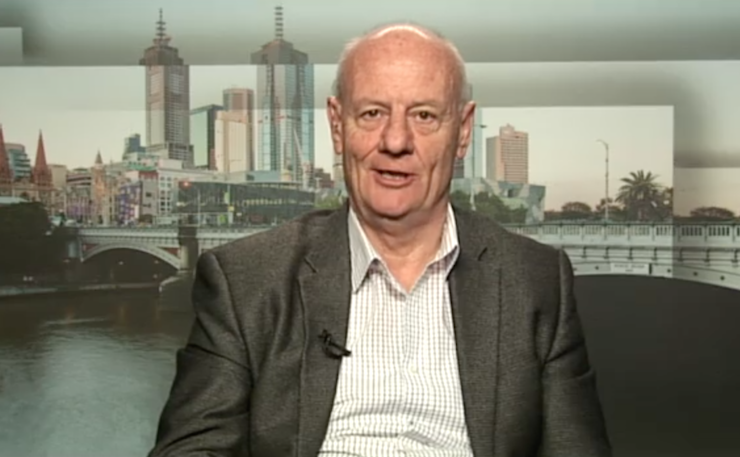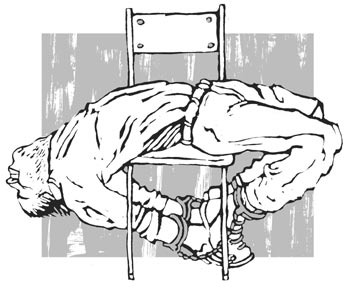The nation’s military courts virtually guarantee a conviction. Don’t expect World Vision to find justice there, writes Michael Brull.
Last week, the Israeli internal intelligence organisation Shin Bet accused an employee of the Christian charity World Vision of funnelling money into the military wing of Hamas in Gaza. Australia responded by suspending funding to World Vision in Gaza. This constitutes a significant victory for Israel. The allegations should be given zero credibility. They should be seen as simply a cynical attempt by the Shin Bet to delegitimise NGOs operating in the occupied territories, and as a way to further tighten the siege on Gaza.
The Magical Diversion Of Money World Vision Never Had
Zero meaningful evidence has been presented against the Palestinian the Shin Bet has accused of diverting funds to the military wing of Hamas, Mohammed El Halabi. The President of World Vision International responded with a statement:
“World Vision’s cumulative operating budget in Gaza for the past 10 years was approximately US$22.5 million, which makes the alleged amount of up to US$50 million being diverted hard to reconcile. Mohammad El Halabi was the manager of our Gaza operations only since October 2014; before that time he managed only portions of the Gaza budget. World Vision’s accountability processes cap the amount individuals in management positions at his level to a signing authority of US$15,000.”

Likewise, Australian World Vision CEO Tim Costello said he was “profoundly perplexed” by the allegations. He observed that El Halabi was alleged to have diverted $50 million, “when the Gaza program is only $3 million and a lot of it is physical assets”, which he has seen. These include “child friendly assets” for traumatised children, “agricultural programs”, growing strawberries and more. Costello noted that “these are physical assets, that you actually can’t just say ‘money’s been diverted, we can’t pay for them’”. He noted that “all of our forensic audits, done by [PricewaterhouseCooper], are absolutely clean”.
Israeli journalist Amira Hass observed that from 2006 to 2014, Halabi did not have the “access to money” that would have enabled the alleged diversion. When he was appointed director of World Vision’s operations in Gaza in late 2014, he still “would not have been able to choose suppliers on his own (as was implied in one of the clauses of the indictment).”
So far, the only evidence presented against El Halabi are his alleged confessions. There are plenty of reasons to be sceptical of statements El Halabi allegedly made in Israeli custody. These include the fact that he was detained for 50 days without being allowed to see any of his family, and before any charges were laid. This included 23 days without a lawyer. As we will see, his prolonged detention likely contributed to any statements he is alleged to have made.
Hass writes that “Halabi was detained for days in a room with asafir – Palestinians collaborators with the Shin Bet, who impersonate detainees for security reasons. He had a hard time dealing with their pressure and abusive methods, Ha’aretz has learned, and intentionally ‘confessed’ to things that were impossible: for example, transfer of sums of money that would have been inappropriate in terms of the overall budget of the branch in Gaza where he worked and his responsibilities.”
TO HELP KEEP WRITERS LIKE MICHAEL BRULL WRITING, SUPPORT NEW MATILDA’S FUNDRAISING DRIVE HERE
Israeli Military Courts Almost Always Convict
The point of slinging mud is that some sticks. Those who aren’t sure about the allegations will simply suggest that they should be resolved in a court of law. The problem is that El Halabi will never get a fair trial, because he is subject to Israeli military courts. Any trial he faces will be intrinsically racist and unjust.
The reason military courts should be regarded as racist is because Palestinians under Israeli rule are subjected to different laws to Israelis under Israeli rule. The United Nations Committee on the Elimination of Racial Discrimination observed that it was “extremely concerned” at the creation by Israel “of two entirely separate legal systems and sets of institutions for Jewish communities grouped in illegal settlements on the one hand and Palestinian populations living in Palestinian towns and villages on the other hand.” It observed that Palestinians and Jewish settlers in the West Bank “are not subject to the same justice system (criminal as well as civil matters).”
These apartheid laws and military courts are not applied to Israelis. They are applied to Palestinians in the occupied territories. And the results are unsurprising.
An internal report from the military courts in 2011 found that 99.74 per cent of cases heard by military courts end in conviction. As remand in custody “for the duration of the proceedings is the rule rather than the exception”, according to prestigious Israeli human rights group B’Tselem, “the vast majority of military court cases end in plea bargains. Defendants prefer to avoid a lengthy trial while in custody, knowing that they risk spending more time behind bars than if they take the prison sentence of a plea bargain.”
B’Tselem’s report notes that in the “vast majority” of cases, “indictments are based on confessions and incriminating testimonies”. In the case of El Halabi, that would be his “confession”, and testimony of other Palestinians left in his cell. This type of evidence is obtained during Shin Bet or Israeli police investigations in a process that “often involves human rights violations”.
World Vision’s Accusers Have A Long Record Of Torture
In 1987, a retired Israeli Supreme Court Justice heading the Landau Commission handed down its findings. It recommended the formal adoption of torture by the Israeli government as official policy. It advised that Shin Bet agents should be able to use “psychological pressure” and a “moderate degree of physical pressure”. As a result, torture was routinely and systematically used against Palestinians in the occupied territories, with an official seal of approval.
In 1999, the Israeli Supreme Court ruled against the use of torture. However, as noted by B’Tselem, it also found that Shin Bet agents who used “’physical pressure’ might not bear criminal responsibility for their actions, if it is subsequently found that they used these methods in the case of a ‘ticking time-bomb’ case, relying on the ‘necessity defense’.” While there was a “significant drop” in the use of torture against Palestinians, the use of torture continued.
B’Tselem and HaMoked found that the Shin Bet “still routinely employs psychological and physical abuse in interrogations. The ISA [Shin Bet] interrogation regime is based on isolation from the outside world and harsh incarceration conditions as a means to psychological pressure and physically weaken the person under interrogation, in conjunction with overt interrogation in the interrogation room.”
Accounts of Shin Bet interrogations and detention were collected by B’Tselem and HaMoked. They found that those interrogated by Shin Bet:
are held in inhuman conditions, in narrow, windowless cells, that are sometimes foul-smelling, constantly lit with artificial lighting painful to the eyes. Some detainees reported being held in solitary confinement, completely isolated from their surroundings. Some reported exposure to extremes of heat and cold, and sleep deprivation.
Hygienic conditions are abominable; among other things, prison authorities did not allow detainees to shower, change clothes, or even use toilet paper. Food is poor in quality and quantity, and detainees lose weight while in custody. In the interrogation room, they are forced by interrogators to sit bound to a chair and cannot move, for hours and even days at a time. Interrogators threaten the detainees, including threats to harm their relatives, shout at detainees and even use force against them. The interrogation system that relies on these methods, both in overt interrogation and in the conditions in which detainees are held, was shaped by the state and is not the result of the initiative of any particular interrogator or prison guard.
These actions are not carried out by so-called “rotten apples”, nor are they exceptions who must be brought to justice. Cruel, inhuman and degrading treatment of Palestinian detainees is inherent to the ISA’s interrogation policy, which is dictated from above, not set by interrogators in the field.

A 2007 report by the two groups found seven particular methods of “special interrogation” employed by Shin Bet. These include sleep deprivation, beatings, painful cuffing, sudden pulling of a person’s body, sudden twisting of the head, and stress positions. These include the “frog” crouch, and the banana position.
The latest report by B’Tselem and HaMoked on Shabak torture was released in December last year. It described the conditions in which Palestinian inmates were held and interrogated in an interrogation facility run by Shin Bet. It found that “about one-third had been beaten or abused by soldiers or police officers in the course of being arrested; at least 14 were interrogated under torture by the Palestinian Authority shortly before being arrested by Israeli security forces.”
They concluded that “The combination of conditions both in and outside the interrogation room constitutes abuse and inhuman, degrading treatment, at times even amounting to torture.” They stressed that “Cruel, inhuman and degrading treatment of Palestinian detainees is inherent to the ISA’s interrogation policy, which is dictated from above, not set by interrogators in the field.”
So as it stands, the evidence against Halabi consists of allegations by the Shin Bet, and confessions he has allegedly made. Confessions after being held for fifty days by an organisation that holds people in “inhuman conditions”, subjecting detainees to solitary confinement, sleep deprivation, denial of showers, toilet paper, and clean clothes. By an organisation with a long record of torture, and which has a strange ability to elicit confessions from most of the Palestinians they detain. And the confession involves diverting more money than El Halabi was able to control, and more money than World Vision in Gaza had during the relevant period.
The way Israel proposes to test the allegations is before apartheid military courts, based on a racially discriminatory legal system which only tries Palestinians for offences in the Occupied Territories, not Jewish settlers or Israeli soldiers. Courts which have a conviction rate of 99.74 per cent.
Part 2 will discuss other terrorists identified by the Shin Bet, and the context of the allegations against World Vision
Donate To New Matilda
New Matilda is a small, independent media outlet. We survive through reader contributions, and never losing a lawsuit. If you got something from this article, giving something back helps us to continue speaking truth to power. Every little bit counts.





